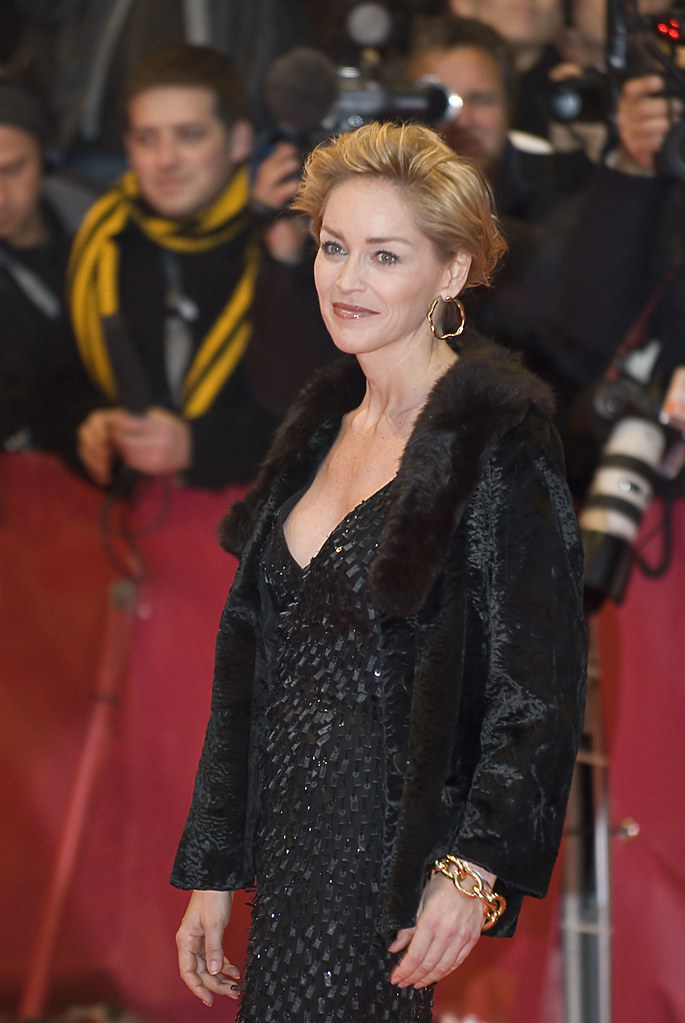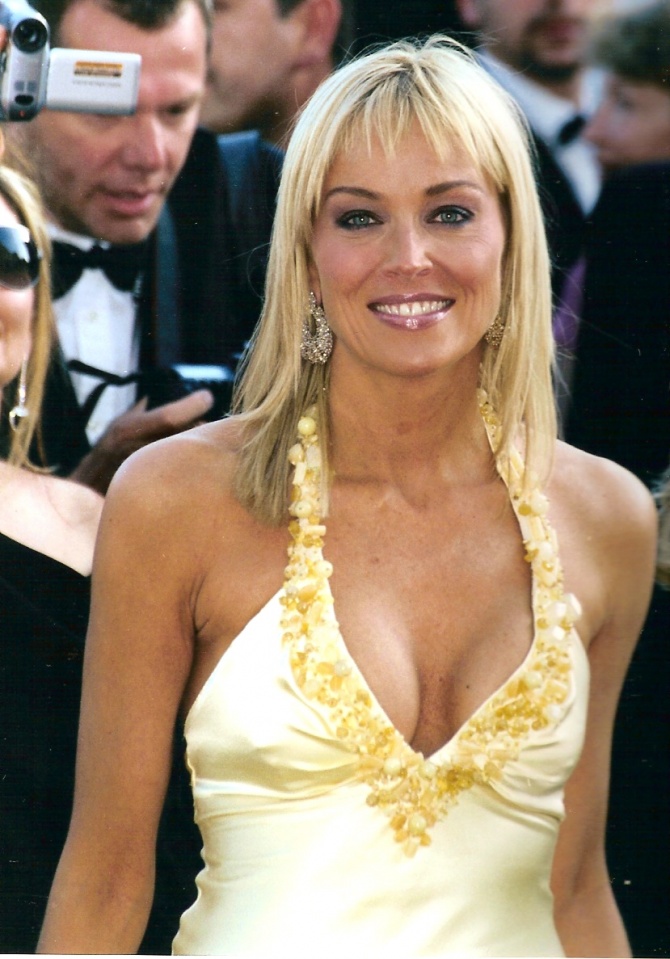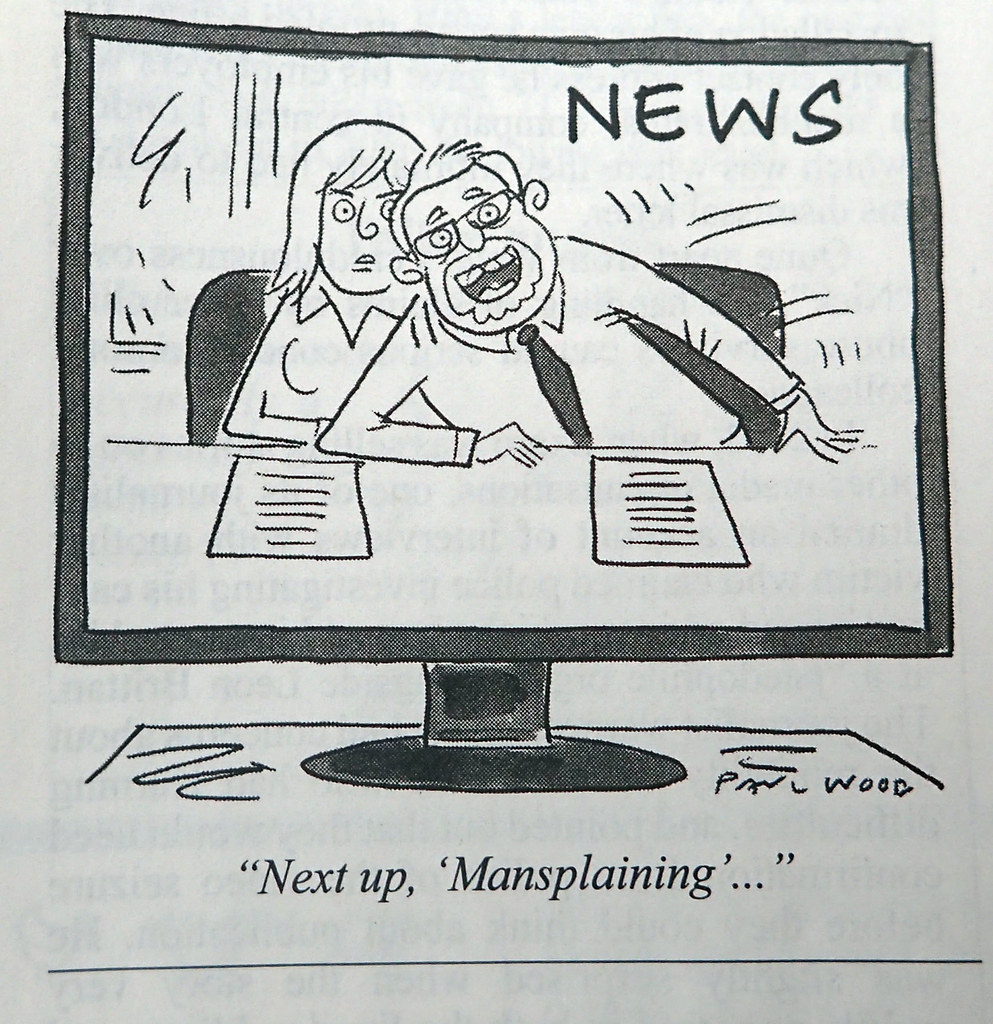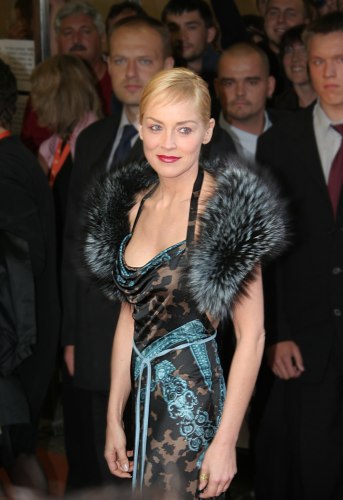
Hollywood, a town built on dreams and often shadowed by stark realities, has long been a place where narratives of power and influence are as central as the stories told on screen. For decades, the industry’s inner workings have been shrouded in a certain mystique, but increasingly, voices from within are pulling back the curtain, revealing the systemic issues that persist. Among these candid voices, Sharon Stone—an actress whose career has spanned a remarkable trajectory from global superstar to acclaimed artist—has offered a particularly sharp and unvarnished perspective on the challenges women face. Her recent remarks about the rarity of respect on set have reverberated, prompting a deeper look at the cultural dynamics that shape the creative process.
Stone, a name synonymous with iconic performances and a formidable presence, recently shared a startling observation: in her long and illustrious career, only two male co-stars met her standard of being “non-misogynistic”: Robert De Niro and Joe Pesci. This isn’t merely a casual aside; it’s a profound statement from an actress of Stone’s stature, one who has navigated the complex terrains of fame, critical acclaim, and intense public scrutiny. Her comments lay bare a persistent truth about an industry often perceived as progressive, yet one where fundamental respect for women, particularly in their professional capacity, remains an elusive commodity. It forces us to confront the stark contrast between the glittering facade of Hollywood and the often-disheartening experiences behind the scenes for many female artists.
Her revelations are not just about personal anecdotes of disrespect; they serve as a potent lens through which to examine broader industry trends and deep-seated cultural issues. From the insidious nature of “mansplaining” that undermines creative agency, to the enduring struggle against typecasting that has long defined her public image, Stone’s insights are a critical blueprint. Her journey, marked by both triumph and tribulation, is a microcosm of the battles many women in entertainment continue to fight, offering a vital perspective on what it means to be heard, valued, and allowed to fully inhabit one’s artistic space without condescension or exploitation. As we delve into her observations, we unpack not only the specifics of her experiences but also the larger cultural and industrial context that makes such stories regrettably common.

1. **Sharon Stone’s Decades-Long Battle with Hollywood Misogyny**
Sharon Stone’s career in Hollywood spans decades, a testament to her undeniable talent and resilience in an industry notorious for its fleeting allegiances. Yet, despite her global stardom and acclaimed performances, she consistently points to a pervasive lack of respect as a recurring theme throughout her professional life. In a recent, remarkably candid interview with Variety, the actress shared a striking confession: in her entire career, she has only worked with two male co-stars whom she considered “not misogynistic.” This declaration from an actor of her caliber—one who has graced screens alongside some of the biggest names—is not just an individual complaint; it’s a damning indictment of a systemic issue that has long plagued Hollywood.
Her statement immediately draws a stark line, separating the vast majority of her professional encounters from these two exceptional individuals. It highlights how deeply ingrained misogynistic behaviors are within the industry’s fabric, making genuine, unadulterated respect a rare and memorable phenomenon rather than a baseline expectation. Stone’s candor underscores the ongoing, often silent struggle for women in the entertainment industry to be treated as equals, to have their professional contributions valued for their merit, and to simply be afforded the same level of regard as their male counterparts. Her words challenge the romanticized image of Hollywood, exposing a harsher reality for many female artists.
This battle against misogyny is far from a new front for Stone; she has, in fact, long been a conspicuous target of sexism within the industry, dating back to the very outset of her breakout into global stardom. Particularly after her electrifying, career-defining role in Paul Verhoeven’s 1992 thriller *Basic Instinct*, she became, almost overnight, a lightning rod for the very misogyny she now speaks out against so powerfully. Her journey through the industry has, therefore, been defined not just by her undeniable acting talent and captivating screen presence, but also by her often-unwilling entanglement with a pervasive culture that frequently reduces women to their perceived sexual appeal, often conveniently overlooking their profound craft, intellectual depth, and artistic contributions.
Her revelations are thus not isolated incidents of individual grievance, but rather the culmination of years, even decades, spent navigating a challenging and often inequitable professional landscape. Stone’s voice adds significant weight to the growing chorus of women exposing the deep-seated issues that have traditionally been swept under the rug. It prompts a necessary re-evaluation of how talent is recognized and nurtured, and how respect, or the lack thereof, fundamentally shapes careers and personal well-being within the cutthroat world of film production. The implication of her singular experience with De Niro and Pesci is that their professional conduct, while lauded as exceptional, should ideally be the industry standard, not an anomaly.

2. **The Rare Sanctuary: Robert De Niro and Joe Pesci on the “Casino” Set**
Amidst a career often marred by dismissiveness and outright disrespect, Sharon Stone vividly recalls her experience on Martin Scorsese’s sprawling 1995 crime epic *Casino* as a rare and cherished oasis of professional integrity and collaborative spirit. It was here, on set, opposite two titans of cinema, Robert De Niro and Joe Pesci, that she finally felt a profound and unmistakable sense of respect, a feeling she describes as almost singular in her extensive career. “They’re so misogynistic — now, that is not Robert De Niro. That is not Joe Pesci, that is not those guys,” she told Variety, with a clear and emphatic distinction that separates them from the overwhelming majority of her other male co-stars. This wasn’t merely a pleasant working environment; it was an experience so exceptional, so genuinely empowering, that it stands out as one of the only times she felt truly seen and valued as an actor and a woman.
Stone’s description of her time on *Casino* paints a compelling picture of genuine, unfettered collaborative artistry, a stark contrast to the stifling atmospheres she often encountered. She spoke with palpable admiration of being “in awe of working with Scorsese and De Niro,” remembering their proactive encouragement and open approach to her performance. She recalled them saying: “‘Give it all to us, baby, just let her rip if you’ve got it, we want it, let’s see what you can do.’” This stands in stark contrast to the often patronizing, dismissive treatment she describes elsewhere, where her contributions were either ignored or actively undermined. For her, working with these legends—particularly De Niro, whom she had explicitly “strived to work with” her entire career—was “the apex,” a moment where she received the coveted “pat on your back from your peers,” a form of professional validation and recognition she admittedly rarely encountered.
The environment cultivated by De Niro and Pesci, under Scorsese’s masterful direction, allowed Stone to fully immerse herself and consequently deliver one of her most acclaimed and powerful performances as Ginger McKenna. Her portrayal of the manipulative, self-absorbed wife of a top gambling handicapper was nuanced, complex, and utterly captivating, earning her a well-deserved Academy Award nomination for Best Actress. This role, while becoming another defining moment in her career for its artistic merit and critical reception, was perhaps even more significant for the empowering and respectful context in which it was created. It was an experience where her input was genuinely welcomed, her presence acknowledged as integral, and her performance allowed to profoundly influence the dynamic of the scene, fostering an authentic “human experience” in their interactions that elevated the entire film.
The profound difference described by Stone suggests that De Niro and Pesci, whether consciously or instinctively, understood the importance of a truly reciprocal acting relationship. They fostered an environment of mutual trust, where each actor could contribute to the collective creative energy without fear of being sidelined or undermined. This rare blend of professionalism and genuine respect allowed her to flourish, tapping into depths of her craft that might have remained inaccessible in less supportive environments. It underscores the significant impact that a truly respectful working relationship can have on the quality and authenticity of a performance, highlighting *Casino* as a powerful example of what is possible when misogyny is effectively countered.

3. **Decoding “Non-Misogynistic”: What Respect Truly Looks Like on Set**
Sharon Stone’s designation of Robert De Niro and Joe Pesci as “non-misogynistic” offers crucial and illuminating insight into what true professional respect genuinely looks like within the high-pressure, often ego-driven environment of a film set. Her poignant contrasting experiences—the dismissive versus the collaborative—illuminate the subtle yet profound differences in how actors can, and indeed should, treat one another. While many co-stars would “literally talk through my close-up, telling me what they think I should do,” De Niro and Pesci apparently engaged in a fundamentally different manner. Their “non-misogynistic” behavior wasn’t simply the passive absence of hostility or active antagonism; it was, more importantly, the proactive presence of active listening, genuine collaboration, and a fundamental acknowledgment of her autonomy and agency as an artist.
The absence of “talking through her close-up” meant that Stone was consistently afforded the critical space and uninterrupted focus necessary to perform, to concentrate deeply on her character’s intricate emotional landscape, and to inhabit those “fractured moments” of raw human experience that are absolutely essential to delivering truly great acting. This profound respect for her individual artistic process is not just a courtesy; it is a hallmark of truly collaborative artistry. It inherently implies that De Niro and Pesci understood the paramount importance of an actor’s concentration and focus during critical takes, allowing her the necessary autonomy to bring her unique interpretation and nuanced contributions to the role without unsolicited interference, patronizing instruction, or disruptive ego.
Furthermore, the notion of “non-misogynistic” behavior extends beyond mere non-interference. It encompasses a willingness to engage in a dynamic, give-and-take creative exchange. Stone’s experiences with her more respectful co-stars suggest a readiness on their part to genuinely absorb and react to her performance, rather than simply delivering their lines in a vacuum. This reciprocal engagement creates a much richer, more believable tapestry of human interaction on screen. It ensures that the scene isn’t a series of isolated monologues but a living, breathing dialogue where each emotional beat and subtle gesture from one actor genuinely informs and influences the other.
This collaborative dynamic is the antithesis of the patriarchal structures Stone critiques. It demonstrates that respect is not merely about politeness, but about recognizing and valuing a co-star’s professional competence and creative contributions. When actors genuinely listen and respond, they elevate each other’s work and the entire project, allowing for the authentic, nuanced performances that truly captivate audiences. This model of mutual artistic trust, exemplified by De Niro and Pesci, serves as a powerful counter-narrative to the prevailing misogynistic tendencies Stone describes, suggesting a more equitable and artistically enriching way forward for the industry.
4. **The “Basic Instinct” Interrogation: A Scene That Defined—and Damaged—Her Career**
Perhaps no single moment has been more simultaneously defining and profoundly problematic for Sharon Stone’s illustrious career than the infamous interrogation scene in Paul Verhoeven’s boundary-pushing 1992 neo-thriller, *Basic Instinct*. This brief, yet sensationally controversial shot, where her enigmatic character Catherine Tramell uncrosses her legs, briefly exposing her without underwear, instantly cemented her image as the quintessential femme fatale of the era and explosively propelled her to global superstardom. Yet, for Stone herself, the scene remains irrevocably shrouded in controversy and personal distress, highlighting a profound breach of trust and exposing the often-predatory aspects of an industry historically keen to exploit and commodify female sexuality for commercial gain.
Stone has consistently and steadfastly maintained that she was never explicitly warned about the specific camera angle and the resulting shot that explicitly exposed her during filming, a crucial point of contention that director Verhoeven has vehemently denied. This alleged lack of consent at such a vulnerable and pivotal moment casts a long and indelible shadow over the scene’s otherwise iconic legacy, fundamentally transforming it from a moment of cinematic daring and subversive artistry into a stark symbol of objectification, exploitation, and vulnerability. Regardless of the differing accounts and ongoing debate, the incident almost immediately became, as Stone describes, a “lightning rod for misogyny in Hollywood,” instantly and rigidly typecasting her into an array of hyper-sexualized roles and unfortunately inviting dismissive, often disrespectful treatment from peers and industry figures who struggled to see beyond the sensationalized, sexually charged public image.
The scene’s enduring and complex impact exemplifies how quickly and irrevocably an actress’s profound craft, intellectual depth, and artistic contributions can be overshadowed by manufactured controversy and the rampant sexual commodification of her image. While Stone delivered an undeniably strong, complex, and critically acclaimed performance in *Basic Instinct*, showcasing her sharp intelligence and captivating presence, her formidable talent often took a distressing backseat to the intense, almost singular, public focus on her newly acquired “sex symbol” status. This pivotal, albeit contentious, moment, originally intended to emphasize her character’s sensual aura and psychological power, instead became a deeply problematic double-edged sword, granting her immense global fame and recognition but simultaneously and severely limiting her artistic range and contributing directly to the very environment of dismissiveness and disrespect she would later articulate.
It was a moment that simultaneously launched and profoundly constrained her artistic trajectory, illustrating with stark clarity the complex, often unfair, and deeply gendered dynamics women frequently face in the unforgiving glare of the public eye. The ripple effects of that single scene extended far beyond the box office, embedding a perception of Stone that she would spend years, if not decades, trying to overcome. This struggle underscores the immense power of a single image to define and, in some ways, detract from an actor’s holistic career, especially when that image is tied to sensationalized sexuality and contested consent. The experience became a significant touchstone in her ongoing battle against an industry that too often defines women by their bodies rather than their artistry, impacting her opportunities and the respect she commanded.

5. **The Weight of “Mansplaining”: How Unwanted Advice Stifled Performance**
Beyond the egregious and headline-grabbing violation on the *Basic Instinct* set, Sharon Stone’s career has been punctuated by more subtle, yet equally insidious and detrimental, forms of disrespect and professional undermining, most notably what has now become colloquially and critically termed “mansplaining.” She recounted numerous instances where male co-stars, often those considered “really big stars,” would offer unsolicited acting advice and directives, frequently delivered in a condescending, patronizing, or overly confident manner, particularly during her crucial close-ups. This behavior, far from being helpful or constructive, actively and profoundly hindered her ability to perform effectively, creating a toxic and creatively stifling environment where her artistic input and professional judgment were systematically devalued before they could even genuinely manifest.
Stone’s articulate explanation of this pervasive phenomenon resonates deeply with the established critical definition of “mansplaining”—an unwarranted comment, explanation, or reason given by a man to a woman, notoriously characterized by a condescending, overconfident, and frequently inaccurate or ill-informed tone. As author Rebecca Solnit, who famously articulated the concept, described, it often stems from a potent combination of “overconfidence and cluelessness,” where the speaker assumes a superior understanding regardless of the actual expertise. In Stone’s specific professional context, this manifested as male actors talking “literally through my close-up, telling me what they think I should do,” presuming their insight was inherently superior or universally necessary, even when her focused, nuanced performance was the precise object of the camera’s attention.
The profound and detrimental impact of this pervasive behavior was its inherently disruptive nature on her sensitive creative process and her ability to maintain character. “They just will not listen to me and will not allow me to affect their performance with my performance,” Stone explained, pinpointing the core issue. This was not merely about annoyance or ego; it was about a fundamental and crippling breakdown in the collaborative spirit that is absolutely vital to the art of acting. When one actor refuses to be truly present and genuinely responsive to another, refusing to acknowledge their artistic agency, it fundamentally undermines the very essence of shared storytelling and authentic scene work, reducing it to a series of disconnected individual efforts.
This persistent undermining, she implies, robs both the performers and the audience of the nuanced, genuine interactions that define truly exceptional cinema. The constant battle against this behavior speaks volumes about the pervasive power dynamics at play on many Hollywood sets, where male dominance can override professional etiquette and artistic integrity. For Stone, it wasn’t just about feeling personally disrespected; it was about the tangible degradation of the artistic product, a failure to achieve the collective “human experience” that elevates a performance beyond individual lines. This form of “mansplaining” thus becomes a barrier to true creative excellence and authentic cinematic moments.
6. **The Art of Listening: Stone’s Philosophy on True Acting**
Sharon Stone’s incisive critique of her “misogynistic” co-stars invariably leads to her articulate and deeply considered philosophy on what truly constitutes “great acting”—a philosophy centered profoundly on the often-underestimated yet utterly vital skill of authentic listening and complete presence. Her palpable frustration with male co-stars who would “talk through my close-up” or, more damagingly, refuse to allow her performance to “affect their performance,” reveals a steadfast and unwavering commitment to an authentic, responsive, and truly collaborative form of acting that transcends mere individual star power or superficial showmanship. For Stone, true artistry in performance is not a solitary pursuit; it is, fundamentally, a shared endeavor, a dynamic and delicate interplay between actors that demands mutual respect and genuine engagement.
“That’s not great acting,” she emphatically stated, referring to the self-absorbed, non-responsive approach of some of her colleagues. She acknowledged their often-perceived greatness, and the industry’s collective adulation—“I mean, I get that you’re great, and everybody thinks you’re wonderful”—but she swiftly and powerfully countered with the essential, often overlooked truth of collaborative acting. For her, the absolute core of acting isn’t about individual brilliance in isolation, a solo performance delivered without connection; it is, instead, about the delicate, demanding, and often vulnerable dance of interaction, a constant give-and-take where each participant truly hears and responds to the other, moment to moment.
This philosophy is beautifully encapsulated when Stone distilled its essence into a powerful, resonant statement: “But listening, being present for those fractured moments is really the human experience.” This isn’t merely a technical tip or a theatrical technique; it’s a profound ethos, a guiding principle that speaks to the very heart of human connection, both on screen and off. It speaks to the immense vulnerability, the deep empathy, and the active intelligence required to truly connect with a scene partner, to respond organically and intuitively, and to allow the nuanced intricacies of each performance to build something far greater, more authentic, and more emotionally resonant than the sum of its individual parts. It is a call for a deeper, more profound engagement.
Her cherished experience with De Niro and Pesci stands out precisely because they, whether consciously or intuitively, embodied this very principle. They created an environment where such a deep and authentic “human experience” could flourish, where each actor’s presence genuinely informed the other’s, making their collaboration not just successful in terms of outcome, but a rare and cherished memory in Stone’s long career. This emphasis on listening and presence is a testament to Stone’s deep understanding of her craft, highlighting that true mastery lies not just in delivering lines, but in the profound, often unspoken, dialogue between souls on screen. It is a philosophy that critiques the pervasive ego and lack of empathy she encountered, offering a powerful alternative model for creative collaboration and artistic integrity.
7. **The Price of Authenticity: Why Stone’s Opinions Are “Unpopular”**
Sharon Stone, far from being just another Hollywood star, has consistently positioned herself as an artist devoted to her craft, even if it means swimming against the current. Her stark declaration that she is “not the most popular actor in town, because people don’t want to hear my, as they say, f***ing opinions,” reveals a profound truth about the industry’s resistance to unvarnished candor. This isn’t merely a reflection of personal preference, but a systemic discomfort with voices that challenge the established order, particularly when those voices belong to women who have experienced the blunt edge of professional disrespect firsthand.
Her opinions, it seems, carry a weight that many in Hollywood would prefer to ignore. When Stone speaks about the pervasive misogyny, the insidious nature of ‘mansplaining,’ or the essential art of listening, she isn’t just airing grievances; she is articulating a critique of deeply entrenched power dynamics. This unflinching honesty, while laudable, inevitably makes her an uncomfortable presence for those who benefit from, or are complacent with, the status quo. Her dedication to speaking truth to power, to foregrounding artistic integrity over superficial pleasantries, marks her as a figure whose insights are as vital as they are, in some circles, unwanted.
Stone’s self-identification as “kind of a weirdo” underscores a crucial aspect of her artistic philosophy: a devotion to being truly present, to inhabiting the moment, regardless of external validation or industry trends. This commitment to authenticity, rather than conforming to an expected mold, is precisely what makes her insights so piercing and, simultaneously, so ‘unpopular’ with those who prefer a more convenient, less self-reflective narrative. Her willingness to articulate these ‘unpopular’ opinions speaks volumes about her unwavering integrity and her dedication to a more equitable and artistically enriching Hollywood, even at a personal cost.
Indeed, her candor acts as a mirror, reflecting uncomfortable truths back at an industry often too keen on its own self-congratulatory image. By vocalizing the consistent disrespect she faced, she compels a deeper scrutiny of the everyday behaviors that undermine women’s professional standing. This isn’t about being liked; it’s about advocating for fundamental changes in how talent is nurtured and how respect is understood, making her a necessary, if sometimes challenging, voice in the ongoing dialogue about Hollywood’s evolution.

8. **Beyond the “Sex Symbol” Trope: Battling Typecasting and Misconceptions**
Sharon Stone’s meteoric rise to global stardom was undeniably intertwined with her portrayal of sexually charged, enigmatic characters, most notably Catherine Tramell in *Basic Instinct*. This indelible image, while propelling her into the pantheon of Hollywood’s elite, also became a gilded cage, trapping her in a specific typecasting that profoundly limited her artistic range and potential. She candidly notes that she was repeatedly “called upon to take off my clothes and play these crazy sociopathic characters because I played one [in multiple past films],” referencing roles in erotic thrillers like *Silver* and action films like *The Specialist*.
This relentless typecasting meant that the industry struggled to see beyond the manufactured persona, overlooking her formidable talent for nuanced, complex portrayals. “I don’t get called upon to play thoughtful, sensitive characters,” she revealed, highlighting the frustrating paradox of a highly acclaimed actress being denied diverse opportunities. Her performances were often praised for their intensity and captivating presence, yet the underlying perception remained fixed on her ‘sex symbol’ status, creating a significant disconnect between her capabilities and the roles offered.
The consequence of this narrow casting was not just a personal artistic frustration, but a broader industry problem. It speaks to how easily female actors, particularly those who achieve fame through roles with a strong sexual component, are reduced to a singular dimension. The industry, rather than celebrating versatility, often prefers to recycle a proven image, thereby stifling the growth and expression of its most talented artists. Stone’s struggle to ‘get *Basic Instinct* off of my head’ illustrates the enduring power of a single role to define an entire career, sometimes to its detriment.
Her experience underscores a pervasive misconception: that an actor’s ability is synonymous with their public image. This reductionist view not only undermines the intellectual depth and craft she brings to her roles but also contributes to the dismissive treatment she encountered. When male co-stars or industry figures see her only through the lens of her ‘sex symbol’ status, it becomes easier to disregard her artistic input, her professional judgment, and her fundamental right to be treated as an equal, skilled collaborator on set.
9. **An Artist Unbound: Stone’s Multifaceted Creative Life Off-Screen**
While Hollywood often tried to confine Sharon Stone to a specific cinematic box, her artistic spirit has always extended far beyond the silver screen. Her revelations hint at a rich, multifaceted creative life that actively counters the simplistic ‘sex symbol’ label. “I’m a painter — I have two shows coming up — and I’m a songwriter, I’ve had three number ones in other countries,” she shared, pulling back the curtain on a dimension of her artistry that remains largely unseen by the mainstream entertainment world.
These pursuits are not mere hobbies; they are integral expressions of her profound devotion to creativity, providing outlets where her artistic vision is unconstrained by industry expectations or the male gaze. As a painter, she finds a different language for expression, one that speaks to her inner world and offers a direct channel for her unique perspective. The prospect of her upcoming shows highlights a dedicated commitment to this craft, signaling a serious engagement that deserves recognition far beyond casual acknowledgment.
Her success as a songwriter, with three number-one hits in other countries, further exemplifies her diverse talents. This achievement, in a completely different creative domain, underscores an innate musicality and lyrical prowess that belies her public image as solely an actress. These accomplishments showcase a breadth of artistic capability that stands in stark contrast to the narrow roles she was often offered in film, proving that her creative depth extends far beyond what Hollywood typically allowed her to display.
Ultimately, these off-screen artistic endeavors serve as a vital testament to Stone’s holistic identity as an artist. They are a powerful rejoinder to an industry that too often defines women by their most sensationalized portrayals. In painting and songwriting, she finds autonomy and affirmation, cultivating spaces where her full creative intelligence and emotional complexity can flourish, offering a sanctuary from the often-reductive pressures of fame and the limitations of typecasting.
10. **The “Barbie” Paradox: How Appearance Shaped — and Limited — Her Career**
Sharon Stone’s striking physical appearance, often lauded for its classic beauty, paradoxically became both an asset and a profound limitation throughout her career. Her insightful comment, “I came into this world looking like a Barbie, so it’s complicated for people to allow me the opportunity to be anything else,” encapsulates a unique struggle faced by many women in the entertainment industry. While conventional attractiveness can open doors, it can also construct a rigid cage of perception, preventing an artist from being seen for their depth, intellect, or versatility.
This ‘Barbie’ paradox meant that her innate physical attributes often overshadowed her acting prowess. Her appearance, rather than being simply a canvas for character, became the character itself, forcing her into a narrow band of roles that emphasized aesthetics over internal complexity. It created an inherent bias, where audiences and industry professionals alike struggled to dissociate her natural beauty from the roles she played, fostering an expectation that she would perpetually embody a certain glamorous, often sexualized, archetype.
The implications of this perception are far-reaching. It contributes to the objectification that Stone has actively critiqued, making it difficult for peers to view her as a serious, multifaceted professional. When one’s entire identity is reduced to outward appearance, the subtle nuances of performance, the intellectual contributions to a scene, and the sheer hard work of character development can easily be overlooked. It fosters an environment where “mansplaining” becomes more prevalent, as her male co-stars assume a right to dictate her performance, failing to recognize her artistic agency.
Her experience serves as a powerful commentary on the broader societal challenge faced by women with conventional beauty standards. The industry, often a mirror of society’s biases, finds it “complicated” to look beyond the surface, thereby limiting opportunities for growth and respect. Stone’s journey is a poignant reminder that true artistic recognition should transcend superficial attributes, celebrating talent and intelligence in all their forms, rather than being confined by preconceived notions of beauty.

11. **A Call for Change: The Enduring Questions Stone’s Story Raises for Hollywood**
Sharon Stone’s candid revelations are far more than a collection of personal anecdotes; they serve as a powerful catalyst for a much-needed industry-wide introspection. Her story compels us to confront an enduring, critical question posed within the very narrative of her experiences: “Do you think Hollywood has improved when it comes to respecting women on set, or do stories like Sharon Stone’s show that change is still too slow?” This query cuts to the heart of ongoing debates about gender equality and professional conduct in an industry often lauded for its progressive facade.
Despite the heightened awareness brought by movements like #MeToo, Stone’s experience of finding only two “non-misogynistic” male co-stars in decades of work suggests that fundamental shifts in behavior and culture remain stubbornly elusive. Her struggle against ‘mansplaining’ and persistent typecasting highlights that while overt harassment might be less tolerated, more subtle forms of disrespect and undermining continue to pervade daily professional interactions. It implies that a truly equitable environment requires more than just the absence of hostility; it demands the active presence of mutual respect and recognition of women’s professional competence.
Stone’s narrative forces us to critically examine the gap between Hollywood’s aspirational image and its often-harsh realities. It prompts a deeper look into the responsibility of male actors, directors, producers, and studio executives to not just avoid misogynistic behavior, but actively champion inclusive, respectful working environments. Her experiences underscore that systemic change isn’t just about policies; it’s about a fundamental re-evaluation of ingrained attitudes and power dynamics that have historically marginalized women in creative roles.
Ultimately, Stone’s voice adds significant weight to the ongoing call for a more equitable future in film. Her story is a poignant reminder that the fight for respect and artistic integrity is far from over, urging the industry to move beyond performative gestures towards genuine, lasting cultural transformation. It’s a challenge to every individual within Hollywood to consider their role in fostering an environment where every talent, regardless of gender, is genuinely valued and heard.

12. **The Quiet Revolution: How Moments of True Connection Elevate Art**
Amidst the challenging landscape Sharon Stone describes, her profound appreciation for Robert De Niro and Joe Pesci illuminates a powerful blueprint for what collaborative artistry can and should be. Their “non-misogynistic” approach was not merely about avoiding disrespect; it was about fostering an environment of active engagement, genuine listening, and reciprocal performance that allowed Stone to deliver one of her most acclaimed roles in *Casino*. This rare experience underscores a “quiet revolution” in how creative collaboration, when built on true mutual respect, can profoundly elevate the artistic product.
When actors genuinely listen and allow each other’s performances to affect their own, the resulting “human experience” on screen transcends individual brilliance to create something far more authentic and impactful. This dynamic interplay, where each nuanced emotional beat is absorbed and responded to, builds a believable tapestry of human connection. It’s this profound, unspoken dialogue between souls on screen that captivates audiences, imbuing films with a depth and realism that isolated performances can never achieve, as perfectly exemplified by the powerful chemistry Stone shared with De Niro and Pesci.
This model, where ego takes a backseat to shared artistic purpose, offers a compelling alternative to the patriarchal structures Stone critiques. It demonstrates that true mastery in acting lies not just in delivering lines, but in the vulnerable, empathetic act of being fully present for a scene partner. This philosophy is not just about professional courtesy; it’s about unlocking greater creative potential, pushing the boundaries of performance, and ultimately producing superior, more resonant cinematic art that genuinely reflects the complexities of human interaction.
Stone’s cherished memory of *Casino* stands as a beacon, illustrating the transformative power of a truly respectful and collaborative set. While her journey reveals significant challenges, it also offers a hopeful vision for a future Hollywood where such environments are the norm, not the exception. It’s a call to embrace a deeper, more profound engagement in the creative process, ensuring that every actor’s presence truly matters, and that the “fractured moments” of human experience are honored, elevating both the art and the artists involved.
Read more about: Doutzen Kroes’ Runway Triumph: A Wardrobe Malfunction Turned Iconic Moment
Sharon Stone’s voice, a blend of candid observation and unwavering artistic devotion, resonates far beyond her own experiences. It challenges Hollywood to look inward, to genuinely question its ingrained biases, and to strive for a culture where respect is not an anomaly but an absolute given. Her story, rich with both struggle and profound insight, ultimately serves as a powerful testament to the enduring fight for women’s rightful place in an industry that must continually evolve to truly honor the diverse talents of all its artists.








